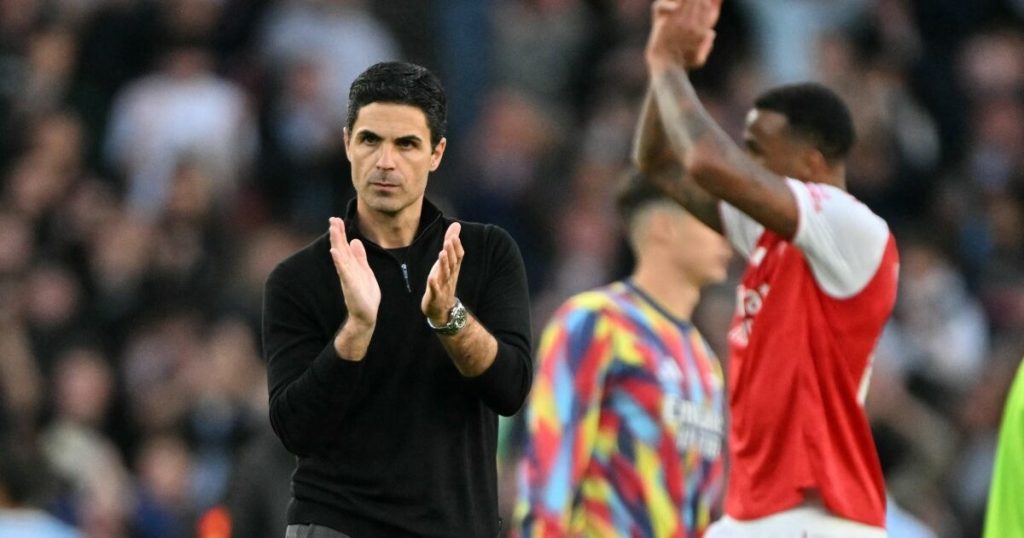Mikel Arteta, the manager of Arsenal Football Club, has found himself at the center of a swirling debate concerning his tactical approach and team selections. The recent 1-1 draw against Manchester City at the Emirates Stadium has amplified existing criticisms, particularly those leveled by prominent football pundits like Gary Neville and Jamie Carragher, who accuse Arteta of overly cautious tactics, metaphorically described as “playing with the handbrake on.” The core of the contention lies in Arteta’s starting lineup choices, specifically the decision to bench winger Reiss Nelson and feature Martin Zubimendi, Declan Rice, and Mikel Merino in midfield, a combination that previously underperformed in a loss against Liverpool. This perceived conservatism allowed Manchester City to take an early lead through Erling Haaland, prompting Arteta to introduce Nelson and Bukayo Saka at halftime, a change that invigorated Arsenal’s attack and eventually led to Gabriel Martinelli’s equalizing goal in stoppage time.
The draw, while a commendable result against the reigning champions, did little to alleviate the pressure on Arteta, who is yet to deliver a major trophy since winning the FA Cup in 2020. The recurring theme of near misses in the Premier League title race – finishing as runners-up for three consecutive seasons – has fueled speculation about Arteta’s ability to transform Arsenal into genuine title contenders. Critics argue that his cautious approach, typified by the team selection against City, ultimately inhibits the team’s attacking potential and hinders their ability to secure crucial victories. The five-point gap between Arsenal and league leaders Liverpool, even at this early stage of the season, adds weight to the arguments against Arteta’s methods.
Arteta, however, vehemently refutes these accusations, asserting that his tactical knowledge and analysis are far more nuanced than the simplistic “handbrake” analogy suggests. He pointed to Arsenal’s dominant periods during the match, particularly in the second half, as evidence of their attacking intent. He argued that such dominance against a team managed by Pep Guardiola, a renowned tactical innovator, is unprecedented and contradicts the notion of a restrictive game plan. He emphasized the difficulty of achieving such dominance while simultaneously “playing with the handbrake on,” highlighting the inherent contradiction in the criticism. He further defended his team selection by citing the need to manage player workloads, particularly in the case of Reiss Nelson, whose previous starts influenced the decision to initially bench him.
The controversy surrounding Arteta’s tactics extends beyond the Manchester City game. His team selections in other matches have also drawn criticism for their perceived conservatism, often followed by inconsistent performances from the team. This pattern has led to questions about Arteta’s ability to effectively utilize the squad’s attacking talent and consistently implement a strategy conducive to winning titles. The manager’s response to these concerns has been to emphasize the complexities of his decision-making, highlighting factors such as player fitness and the specific demands of each opponent. He maintains that his approach is based on meticulous analysis and a deep understanding of the game, rather than an inherent aversion to risk. He insists that his critics are oversimplifying a complex tactical landscape, focusing on isolated incidents rather than appreciating the broader strategic picture.
The upcoming League Cup fixture against Port Vale offers Arteta an opportunity to shift the narrative. While the competition is considered less prestigious than the Premier League, a convincing victory could provide a much-needed boost in confidence and allow Arteta to experiment with different tactical approaches and player combinations without the same level of scrutiny. However, the injury to winger Reiss Nelson, sustained during the Manchester City game, adds another layer of complexity to Arteta’s selection dilemmas. The manager confirmed that Nelson faces a spell on the sidelines, necessitating further adjustments to his attacking plans. The injury is a significant setback for Arsenal, given Nelson’s impressive form and his potential to contribute meaningfully to the team’s attacking output.
The debate surrounding Arteta’s tactical approach is likely to persist throughout the season, especially if Arsenal continues to fall short of their title aspirations. The manager faces a critical challenge: to demonstrate that his methods are not overly cautious but rather strategically sound and capable of delivering the silverware that has eluded Arsenal for so long. He must find a balance between his pragmatic approach and the need to unleash the team’s attacking potential, proving to his detractors that his vision for Arsenal is one that can lead to sustained success. The upcoming weeks and months will be crucial for Arteta, as he navigates the pressures of the season and endeavors to solidify his position as the right man to lead Arsenal forward. His ability to adapt, evolve, and ultimately deliver tangible results will determine the trajectory of his tenure and the fate of Arsenal’s ambitions.


